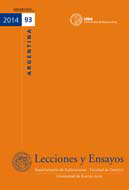Rousseau and the Moral Contract
Keywords:
rousseau, social contract, moral contract, liberty, equality, ethics, politicsAbstract
Rousseau’s work talks to modernity, despite his resistance and distrust to extreme rationalism. In its way, Rousseau takes the issues raised by Machiavelli and La Boétie: political engineering and liberty. Rousseau is unhappy with the tendency to justify, in the name of order, the subjugation and exploitation of man. In The Social Contract he states the conditions for his model republic, which ensures happy freedom. Rousseau demonstrates how to obey orders without losing freedom. His task will be to show how it is possible to overcome the autonomy of certain spheres: combine politics and ethics, public and private, law and morality, putting political engineering in the service of morality. The formal character of the social contract operates as the moral foundation for political legitimization, thus turning the emerging republic in the best of all possible worlds. This is the core of the exercise of moral autonomy as opposed to the heteronomy suggested by rationalists political thinkers. And so, the distinction between morality and law is weakened, but leaves established the primacy of politics as key to understand the situation of men and as means for the attainment of freedom in a just order.
Downloads
References
ARMSTRONG, Arthur H., Introducción a la FilosofíaAntigua, Buenos Aires, Eudeba, 1966.
BERLIN, Isaiah, Libertad y Necesidad en la Historia, Madrid, Revista de Occidente, 1986.
BLOOM, Alan, “Jean-Jacques Rousseau”, en STRAUSS, Leo y CROPSEY, Joseph (comp.), Historia de la Filosofía Política, México, FCE, 1993.
BOBBIO, Norberto, Estudios de historia de la Filosofía: de Hobbes a Gramsci, Madrid, Debate, 1991.
D´AURIA, Aníbal, El pensamiento político, Buenos Aires, Depalma, 1999.
– , Rousseau: su crítica social y su propuesta política, Buenos Aires, La Ley, 2007.
D´AURIA, Aníbal y BALERDI, Juan, Estado y Democracia, Buenos Aires, Docencia, 1996.
HOBBES, Thomas, Leviathan, México, FCE, 1994.
DE LA BOÉTIE, Ètienne, Discurso sobre la servidumbre voluntaria, Buenos Aires, Libros de la Araucaria, 2006.
LOCKE, John, Ensayo sobre el gobierno civil, Buenos Aires, Prometeo, 2005.
MAQUIAVELO, Nicolás, El príncipe, Buenos Aires, Plus Ultra, 1984.
ROUSSEAU, Jean-Jacques, Emilio o de la Educación, Barcelona, Biblioteca de los grandes pensadores, 2002.
– , El contrato social, Madrid, El Ateneo, 2001.
– , Discurso sobre el origen de la desigualdad entre los hombres, Madrid, Ed. El Ateneo, 2001.
– , Discurso sobre las ciencias y las artes, Madrid, El Ateneo, 2001.
– , Sueños de un paseantesolitario, Buenos Aires, Nuevo Siglo, 1977.
– , Escritos sobre la paz y la guerra, Madrid, Centro de Estudios Constitucionales, 1982.
– , Cartas a Sofía. Correspondencia filosófica y sentimental, Madrid, Alianza, 1999.
– , Discurso sobre la Economía Política, Madrid, Tecnos, 1991.
SPINOZA, Baruch, Tratato teológico-político, México, Porrúa, 1982.
– , Ética, México, Porrúa, 1982.
Downloads
Published
How to Cite
Issue
Section
License

This work is licensed under a Creative Commons Attribution-NonCommercial 4.0 International License.











